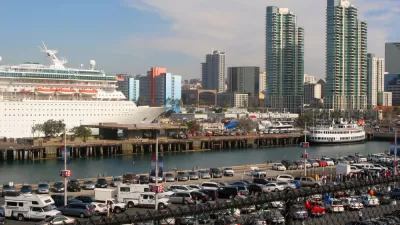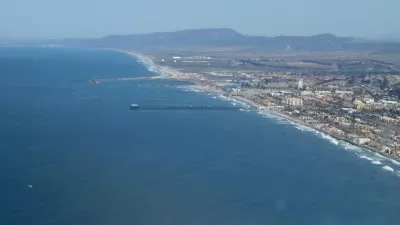One of the most powerful agents of environmental protection in the state of California is faced with what some believe is an existential threat.
Steve Blank pens an op-ed to raise awareness of dramatic changes at the California Coastal Commission. According to Blank, "for as long as the commission has existed, real estate developers and their lobbyists have wanted to weaken it, or dispatch it altogether. Now those efforts have reached a critical point. Lobbyists for land developers have persuaded commissioners to fire Charles Lester, the executive director of the Coastal Commission's staff."
Tony Barboza broke the news about the shakeup at the Coastal Commission, which is tasked with overseeing development along the California Coast according to powers established by the California Coastal Act of 1976.
Blank begins by celebrating the state's coast, crediting the work of the Coastal Commission in protecting "pristine coastline" and "unspoiled beaches" that are "the envy of the world." Los Angeles Times columnist Steve Lopez wrote similar sentiments recently in reaction to the news of the move to fire Lester.
Blank's op-ed offers perspective on the function of the Coastal Commission by comparing it to a local zoning board:
The Coastal Commission is the zoning board for the whole California coast. For example, there's a proposal to build 1,100 houses in the coastal zone in Southern California before the commission right now. At $1.5 million for each house near the ocean, that's nearly $2 billion at play. Huge sums are at stake for developers, who regularly challenge coastal staff rulings, donate heavily to politicians, and hire teams of lobbyists to persuade commissioners to make an exception for their individual project.
Blank offers more perspective by noting the irony of the current controversy: "The cabal of commissioners pushing to remove Lester are appointees of Gov. Jerry Brown — the same governor who signed the Coastal Act into law 40 years ago."
FULL STORY: The coastline belongs to all Californians—but maybe not for long

Alabama: Trump Terminates Settlements for Black Communities Harmed By Raw Sewage
Trump deemed the landmark civil rights agreement “illegal DEI and environmental justice policy.”

Study: Maui’s Plan to Convert Vacation Rentals to Long-Term Housing Could Cause Nearly $1 Billion Economic Loss
The plan would reduce visitor accommodation by 25% resulting in 1,900 jobs lost.

Why Should We Subsidize Public Transportation?
Many public transit agencies face financial stress due to rising costs, declining fare revenue, and declining subsidies. Transit advocates must provide a strong business case for increasing public transit funding.

Paris Bike Boom Leads to Steep Drop in Air Pollution
The French city’s air quality has improved dramatically in the past 20 years, coinciding with a growth in cycling.

Why Housing Costs More to Build in California Than in Texas
Hard costs like labor and materials combined with ‘soft’ costs such as permitting make building in the San Francisco Bay Area almost three times as costly as in Texas cities.

San Diego County Sees a Rise in Urban Coyotes
San Diego County experiences a rise in urban coyotes, as sightings become prevalent throughout its urban neighbourhoods and surrounding areas.
Urban Design for Planners 1: Software Tools
This six-course series explores essential urban design concepts using open source software and equips planners with the tools they need to participate fully in the urban design process.
Planning for Universal Design
Learn the tools for implementing Universal Design in planning regulations.
Smith Gee Studio
Alamo Area Metropolitan Planning Organization
City of Santa Clarita
Institute for Housing and Urban Development Studies (IHS)
City of Grandview
Harvard GSD Executive Education
Toledo-Lucas County Plan Commissions
Salt Lake City
NYU Wagner Graduate School of Public Service





























